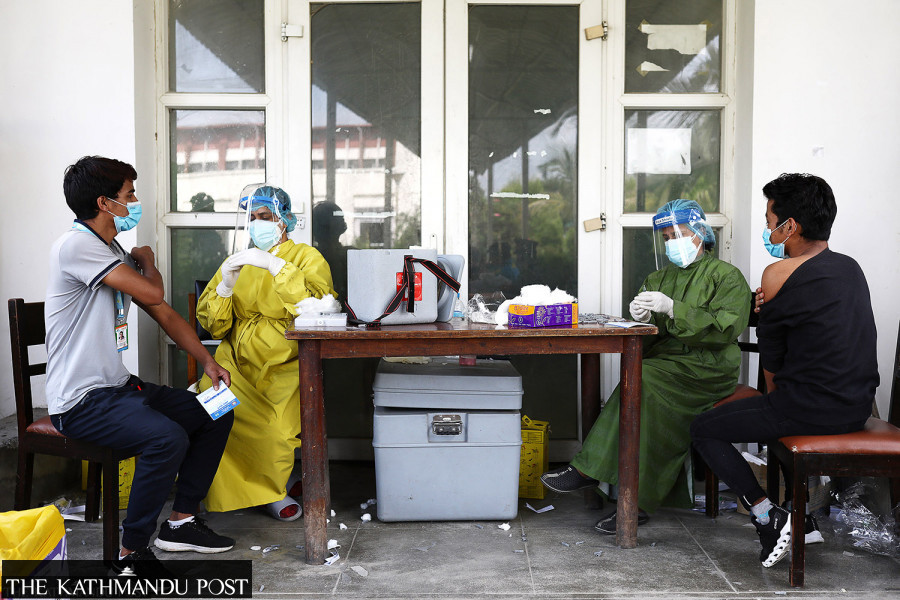Health
Nepal’s booster shot pace dismal, despite drive starting weeks before WHO advisory
In the 52 days since the campaign started, only 1,515,507 people have taken booster shots.
Arjun Poudel
Weeks before the World Health Organisation formally recommended booster dose, Nepal opened additional shots—first for frontline workers, then to elderly people and to the general population above 18 years old, but the pace of vaccination has remained sluggish.
The country started administering booster shots from January 17, while the UN health body recommended additional shots only this Tuesday.
However, in the last 52 days, just 1,515,507 people have taken the booster shots— around 25,000 people are getting immunised every day, which is very dismal, according to public health experts.
“The Technical Advisory Group on Covid-19 Vaccine Composition strongly supports urgent and broad access to current Covid-19 vaccines for primary series and booster doses, particularly for groups at risk of developing severe disease, given that current Covid-19 vaccines continue to provide high levels of protection against severe disease and death, even in the context of the circulation of Omicron,” reads the WHO’s recommendation.
Omicron has become the dominant variant globally, rapidly replacing other circulating variants. The third wave of the pandemic in Nepal was also driven by the Omicron variant— first by the BA.1 sublineage and later by the BA.2 sublineage. Before the authorities could figure out the cause of the surge in new cases, the new variant had already spread inside the country.
Despite the recommendation of public health experts, virologists, epidemiologists as well as infectious disease experts to start giving booster shots, the government delayed offering the shots saying that the World Health Organisation has not recommended the same.
By the time Nepal started the booster shots, the country was already gripped by the third wave of the Covid-19 pandemic, which killed hundreds and infected thousands of people throughout the country.
“We had urged the government not to wait for the WHO’s recommendation for booster shots, as several countries including Israel had already started offering fourth shots and others started the boosters,” Dr Janak Koirala, an infectious disease expert, told the Post. “Studies show that booster shots are needed and it is still necessary.”
In the initial stage, frontline workers including doctors, nurses, paramedics, lab technicians, hospital staff and ambulance drivers were given the third doses.
Then journalists, bureaucrats, lawmakers, those serving in diplomatic missions, financial institutions, prisoners, elderly people at old age homes and refugees who were vaccinated in the first phase of the immunization campaign starting January 27, 2021, were offered the booster shots. Later additional shots were offered to elderly people and opened to all from February 12.
Doctors say that even if the new infection rate has declined significantly of late, there is no certainty that new cases will not surge again as the virus keeps mutating.
Data provided by the Health Ministry show that only around five percent of the total population has taken booster shots in the last 52 days.
Public health experts say that such a lethargic approach will not help authorities avoid another possible outbreak in the coming days.
“Authorities have opened booster shots to all but an awareness drive has not been launched effectively like in the past,” said Dr Prabhat Adhikari, an infectious disease expert. “People might not have been seeking booster shots, due to the current decline in new infections. But this will be risky, as the situation could change any time.”
The UN health agency said that vaccines prevent infection and transmission, in addition to providing protection against severe disease and death. Studies show that people immunised against Covid-19 would lose approximately half of their defensive antibodies every 108 days or so.
Experts say that time has not come to slow down the vaccination pace and people may not seek vaccines unless authorities encourage them to do so.
“There may be thousands of people, who were inoculated six or more months ago,” said Dr Biraj Karmacharya, an epidemiologist. “Authorities should bring a programme to ramp up vaccination pace. All eligible people need primary doses and boosters. As we have experienced and witnessed the worst case scenario, we should not underestimate the possible risks.”
Health Ministry officials said that it is the responsibility of the local level governments to speed up the vaccination process.
“There might be some confusion in provincial and local levels regarding the administration of booster shots,” Dr Sangeeta Kaushal Mishra, spokesperson for the Health Ministry, said. “We have urged agencies under those governments to boost the vaccination pace including the administration of booster shots.”
On Wednesday, 224 people tested positive to Covid. So far,18,200,930 people have been fully vaccinated against the disease. So far, Nepal has received 47,882,800 doses of Covid-19 vaccines—AstraZeneca, Vero Cell, Moderna, Janssen and Pfizar-BioNTech.




 19.12°C Kathmandu
19.12°C Kathmandu















